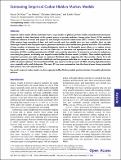Estimating empirical codon hidden Markov models
Abstract
Empirical codon models (ECMs) estimated from a large number of globular protein families outperformed mechanistic codon models in their description of the general process of protein evolution. Among other factors, ECMs implicitly model the influence of amino acid properties and multiple nucleotide substitutions (MNS). However, the estimation of ECMs requires large quantities of data, and until recently, only few suitable data sets were available. Here, we take advantage of several new Drosophila species genomes to estimate codon models from genome-wide data. The availability of large numbers of genomes over varying phylogenetic depths in the Drosophila genus allows us to explore various divergence levels. In consequence, we can use these data to determine the appropriate level of divergence for the estimation of ECMs, avoiding overestimation of MNS rates caused by saturation. To account for variation in evolutionary rates along the genome, we develop new empirical codon hidden Markov models (ecHMMs). These models significantly outperform previous ones with respect to maximum likelihood values, suggesting that they provide a better fit to the evolutionary process. Using ECMs and ecHMMs derived from genome-wide data sets, we devise new likelihood ratio tests (LRTs) of positive selection. We found classical LRTs very sensitive to the presence of MNSs, showing high false-positive rates, especially with small phylogenies. The new LRTs are more conservative than the classical ones, having acceptable false-positive rates and reduced power.
Citation
De Maio , N , Holmes , I , Schlötterer , C & Kosiol , C 2013 , ' Estimating empirical codon hidden Markov models ' , Molecular Biology and Evolution , vol. 30 , no. 3 , pp. 725-36 . https://doi.org/10.1093/molbev/mss266
Publication
Molecular Biology and Evolution
Status
Peer reviewed
ISSN
0737-4038Type
Journal article
Collections
Items in the St Andrews Research Repository are protected by copyright, with all rights reserved, unless otherwise indicated.

